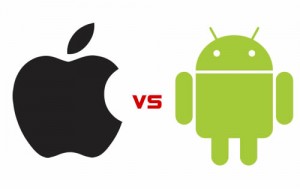
As anyone who has ever been a true fan of anything knows, feelings concerning rivals run deep. Rivals are not just competitors. Rivals are the most important competitor, the most hated competitor. Rivals are the competitor that fans love to hate. This doesn’t just happen in sports. Think about “Coke v. Pepsi,” “Democrats v. Republicans” or even “Xbox v. Playstation.” The most recently developed rivalry, the one on which very few smartphone owners can resist stating their opinion, is “Apple v. Android.”
If you are reading this, then there is a good chance that you have already decided for yourself which phone is better. Still, let’s go ahead and look at some specific categories.
Hardware
With the release of the iPhone4 and the iPhone4s, Android phones have lost some ground in the hardware department. Looking at previous cycles shows that this loss is only temporary. Due to the fact that the Android OS can be used on a much larger number of phones made by different manufacturers, there is an inherent competitive edge with Android phones. While Apple may introduce a new version of the iPhone every year, Android phone manufacturers have been sustaining a three-month cycle on new releases of hardware and software.
Even with similar hardware there does seem to be a distinct difference in the new iPhones. The melding of the iOS and the hardware is meticulous with the iPhone, giving the phone a much smoother performance and making both the hardware and software shine more than it would with an Android OS.
Cost
While all wireless carriers are willing to make great deals on new phones when a new customer signs a contract, all too often the phones are lost, stolen or damaged before the contract is actually finished. If the customer does not have phone insurance, replacement of the previous phone can prove to be costly.
Buying a new replacement model from the wireless carrier will run the same for either brand. The oldest available phones can be found in the $330 range, while the newest will likely be priced near $650. However, when searching for used or refurbished replacements, Android phones come out ahead.
Currently only 4 versions of the iPhone are available online at Verizon Wireless, while there are 34 Android phones. Because there are so many versions of Android and an abundance of phones available, the prices of used Android phones are much lower than the prices of those phones made by Apple. Early Android phones are available on websites like eBay for less than $100 while early iPhones start at $150.
Contracts, depending on what the user needs, are roughly the same from carrier to carrier, give or take $20. However, those who become a new cellular customer with anyone but Sprint will have to be careful about their data usage. Those iPhone apps, as well as connections between the iPhone and the iCloud, often use more data than customers realize. This increases the possibility of sending users over the edge of their plan’s limits. Customers who have AT&T or Verizon Wireless can be grandfathered in to qualify for unlimited plans, but these are not available for new users.
Safety
Many iPhone users will tout the responsiveness and usefulness of the apps that they are able to buy from Apple. Apple’s vetting process to decide what goes into the marketplace is very strict. Possible iPhone apps are checked for any number of issues, causing many more to be rejected than are accepted and added to the market. Apple chooses to set the iPhone apart from Android and other competitors in this way. In fact, when one fraudulent app slipped through just last week, it was big news to many iPhone users. While it may not be the last time this happens, instances like this will be few and far between.
While Google does care about the safety and reliability it portrays to its users, Google vets its apps only on a user-reporting system, prescreening for only technical issues. Because of this, Google had to delete 27 apps that were infected with a specific type of malware in December of 2011. This is not an uncommon occurrence. However, Google stands by the belief that the independence afforded the users of the Android OS will trump the negatives that arise from that independence.
Security V. Freedom
In the end, the decision of which is better belongs to the individual user. Some iPhone users are just Apple fans who will never use another phone. They will tell you that theirs is the best. There are some who do not care about anything except owning the newest, latest and greatest. There are those who want to work fast on a seemingly safe and dependable system. The iPhone is for them as well. Those who enjoy using their own creativity and ingenuity inside of a clearly defined box, where the manufacturer makes the end call on all of the options and abilities available on their phone, will be happy with the iPhone.
Those who want a wide range of options when it comes to phones and do not like to be told what they cannot do by the manufacturers of the products they buy are much more likely to appreciate the freedom that comes with the Android OS. While there is slightly more instability to the system, having the ability to develop and make available applications without “Big Brother Apple” looking over their shoulder is important. Even those who do not plan on developing or using their own apps for the Android can take pleasure in knowing that they are supporting the company that believes a lack of restriction has now led to and will continue to lead to some amazing ideas.
